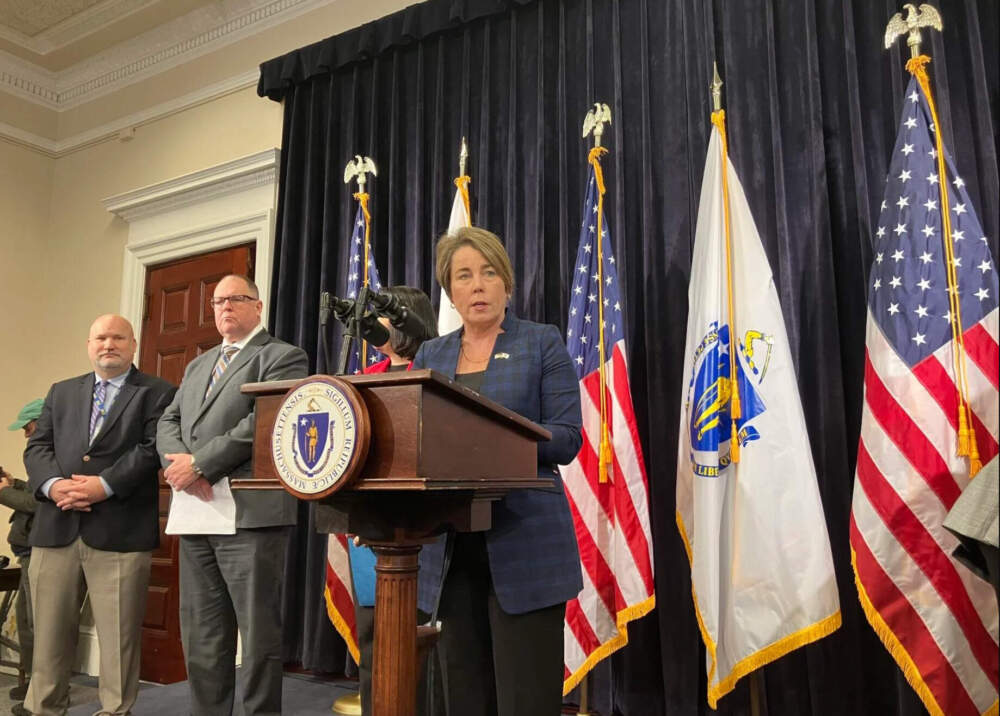Advertisement
New Mass. state police unit will target hate crimes

A new state police unit will work with other law enforcement agencies and community partners as Gov. Maura Healey's administration looks to bolster strategies for addressing hate-based incidents tied to race, ethnicity and religion, among other biases.
The Hate Crimes Awareness and Response Team (HART) will be tasked with improving statewide data collection efforts to identify patterns and trends, developing "advanced training" with the Municipal Police Training Committee, and improving law enforcement coordination at the federal, state and local levels, Healey announced Monday.
Healey said HART is part of the commonwealth's broader approach for deterring hate crimes and protecting at-risk individuals, as other law enforcement and state agencies, plus the state's Task Force on Hate Crimes, continue their efforts to promote tolerance.
"I think what today is about is a recognition of the moment that we are in as a country and as a commonwealth, and it is appropriate and good that we are taking steps to enhance law enforcement's capability when it comes to intelligence gathering and investigative techniques, information sharing," Healey said at a press conference. "It will further help our ability to hold those accountable who need to be held accountable for perpetrating hate crimes, and it will also help us get better ahead of what is happening in this space, where we have seen here and around the world increased incidents of hate."
The team is staffed by four to five sworn state police members who will function as a "primary point of contact for local law enforcement, community and religious groups in a specific geographic area," Interim Col. John Mawn Jr. said. He said the team will coordinate closely with the Fusion Center, which monitors threats, security updates and suspicious incidents.
"The HART team is a diverse and multilingual group of troopers who have demonstrated exceptional investigative experience and skill," Mawn said. "Their work will continue to build upon the many proactive initiatives and strong partnerships in Massachusetts, where our level of public safety coordination is unprecedented."
Attorney General Andrea Campbell said she looks forward to working with the team, as she vowed her office will continue to tackle hate, harassment, discrimination and bullying, among other issues. Campbell urged residents who have experienced acts of hate to file complaints with her office.
Massachusetts logged 440 hate crime incidents last year, and 406 in 2021, according to a report from the Executive Office of Public Safety and Security. It was the highest volume since 2002, Healey's office said.
"In recent years, we've seen not just around the country but even here in Massachusetts, attacks on Black churches with increasingly open declarations of white supremacy and organized white nationalism; spikes in anti-immigrant and anti-Latino rhetoric that target the vulnerable and betray our nation's ideals as a beacon of hope; cruel attacks on the members of the Asian-American community, especially during COVID and beyond; a rise in homophobic and transphobic rhetoric and violence," Healey said. "The Jewish community has experienced a frightening surge in antisemitism, especially in the last month, but also for some time before that. And there's been a rise, as well, in Islamophobic incidents."
Massachusetts recorded the country's sixth-highest rate of antisemitic harassment, vandalism and assault in 2022, as well as the second-highest number of white supremacist propaganda incidents, according to a report from the Anti-Defamation League's Center on Extremism.
The report had called Beacon Hill lawmakers to pass a string of bills to strengthen hate crime statutes, install protections for hate crime victims dealing with property damage, and clamp down on online harassment like doxing. House Speaker Ron Mariano and Senate President Karen Spilka have not identified hate crime legislation as a priority this session, though lawmakers this fall voted to override Healey's veto that had to sought to slash funding for a nonprofit security grant program, intended to benefit groups at high risk for terrorists attacks and hate crimes.
Jeremy Burton, executive director of the Jewish Community Relations Council of Greater Boston, called the HART team a "step in the right direction."
"There is a higher level of coordination that has to happen from the local to the federal (levels)," Burton told the News Service. "Not every local police department has the capacity or the training necessary to analyze everything, and certainly doesn't have a direct line to all levels, like the federal government, so this is definitely one more tool in that toolbox. And frankly, at a time like this, where there is an incredible rise in antisemitism and hate, we need all the tools we can get."
Middlesex District Attorney Marian Ryan said she hopes the HART team will serve as a partner to her Anti-Hate, Anti-Bias Task Force.
"The more partners, the better, and we'll have to see how this goes," Ryan said. "Unfortunately, there's more than enough work for people."
Ten school districts are also receiving grants totaling nearly $462,000 to cover professional development for educators, community engagement and other efforts to clamp down on bias incidents and hate crimes, the Healey administration also announced Monday.
Lt. Gov. Kim Driscoll said another $340,000 in funding is also available to school districts that have experienced hate crimes or incidents of bias in the last two years but have not received grant money this year. The grants are meant to spur partnerships between schools, community groups and law enforcement, she said.
"There has to be a unity of purpose, authentic relationships with the impacted groups, and proactive partnerships on the ground to make the type of lasting change we hope to," Driscoll said.